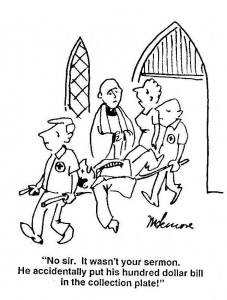Thoughts from Lori +
The Rector is returning from a brief vacation. Look for her regular article next week.
Vestry Meeting Tomorrow Night
Thursday, August 21 at 7:00 p.m.
We’re on Facebook!
Be sure to check us out and “friend” us! “St Paul’s Episcopal Church”
Available for your convenience
For the ease and convenience of those of us who need special assistance, we have a wheelchair and two walkers available for use here at the church. In some cases, that might make attendance easier than unloading your own wheelchair or walker. Feel free to ask for assistance if you need it. Also, the clergy are most willing to take Communion to you in your seat. Simply let the usher or the celebrant know of your request.
August 24 Servants:
Ushers: Donald Jaworski, Rick Carlstedt Lector: Judy Robel Intercessor: Judy Robel Eucharistic Ministers: Deb Lang, Charlie Boak Vestry Person of the Day: Marilyn BellNew Mother’s Class
The St. Paul Diaper Bank is holding classes for new mothers on Thursdays from 1:00-2:30 p.m. at the McHenry Chamber Office. Classes are free and attendees will receive a package of diapers. They are also looking for donations of the “What to Expect” books. Questions? Please call the church office at 815-385-0390.
Summer Diaper Drive is still going on!
Please help us by bringing your diaper donations to church on Sunday mornings. We will also accept monetary donations. Checks should be made out to the “St. Paul’s Diaper Bank.” Let’s make this a huge success! Remember, every little bottom counts.
June Collection = 619 July = 556 August (as of 8/20) = 591Lessons and Hymns
Sunday, August 24th (Pentecost XI – Proper 16 A)
by the Rev. William P. McLemore
THE SCRIPTURE LESSONS:
The First Reading: The Track I readings are Exodus 1:8-2:10 and Psalm 124; the Track II readings are Isaiah 51:1-6 and Psalm 138. Exodus relates the killing of Jewish male children by the Egyptian king and how Moses is born and spared in this terrible pogrom. The reading from Isaiah has the prophet reminding the people that God says “my salvation will be forever, and my deliverance will never be ended.” The Track I Psalm relates the deliverance of God and the Track II Psalm commends the nurture and protection of Almighty God.
The Epistle: Romans 12:1-8. Here, St. Paul again affirms the various gifts given to people and that all are part of the body of Christ.
The Gospel: Matthew 16:13-20. In this portion of Matthew, Jesus asks his disciples who the people think he is. Simon Peter answers, ‘You are the Messiah, the Son of the Living God.’
THE HYMNS:
PROCESSIONAL HYMN: No. 525. “The Church’s One Foundation.” This hymn was written by Samuel John Stone (1839-1900) in response to the liberal interpretation by the Rt. Rev. John William Colenso (1814-1883), the first Anglican bishop of Natal. Bishop Colenso was also a mathematician, theologian, biblical scholar, and social activist. Stone was an Anglican priest who felt deeply troubled by Colenso’s ideas about Christianity and especially the interpretation of the Bible. Thus the third verse of his hymn: “Though with a scornful wonder men see her sore oppressed, by schisms rent asunder, by heresies distressed; yet saints their watch are keeping, their cry goes up, ‘How long?’ And soon the night of weeping shall be the morn of song.” The tune, “Aurelia” was composed by Samuel Sebastian Wesley (1810-1876).
THE SEQUENCE HYMN: No. 435. “At the Name of Jesus.” This hymn was written by Caroline Maria Noel as processional music for Ascension Day. It is based on Philippians 2:9-10 which speaks of bowing the knee before Christ. Some biblical scholars think that St. Paul himself quoted it from an early Christian hymn. The tune, “King’s Weston” was composed by Ralph Vaughan Williams in 1925 expressly for this hymn.
PRESENTATION HYMN: No. 523. “Glorious Things of Thee Are Spoken.” This hymn is based on Isaiah 33:20, “Zion, city of our God” and first appeared in John Newton’s Olney Hymns, 1779. It has been in our hymnals since 1874 and appears as originally written except for one line in the second stanza. The tune, “Austria,” was composed by Franz Joseph Haydn for the national anthem of Austria at the instigation of Count von Saurau, who wanted his country to have a counterpart to England’s “God Save the king.” The melody comes from an old Croatian folk Song.
COMMUNION HYMN:No. 707. “Take My Life and Let It Be.” What better hymn to sing upon sharing God’s Holy Sacrament than one of complete and total surrender? This hymn was written by a woman, Frances Ridley Havergal, who was the daughter of an Anglican priest that also wrote many hymns. She wrote her first hymn at the age of seven and suffered from extremely frail health most of her life. She is the author of four hymns in our hymnal and composed the music for “On Our Way Rejoicing” in the 1940 hymnal. The tune is one of over two dozen composed by the Anglican priest-musician, the Rev. John Bacchus Dykes. It’s gently flowing melody reflects the offering towards God of our whole person: “Take my will and make it thine; it shall be no longer mine. Take myself, and I will be, ever, only, all for thee.”
RECESSIONAL HYMN: No. 334. “Praise the Lord, Rise Up Rejoicing.” This hymn was written by the Rev. Canon Howard Charles Adie Gaunt (born 1902), a cleric and teacher at Malvern College, Malvern, Worcestershire, England (1937-1953). The last verse hearkens to Paul’s II Corinthians 5:17, “So if anyone is in Christ, there is a new creation.” The tune, “Alles ist an Gottes Segen,” is a melody attributed to Johann Balthasar Konig (1691-1750) harmonized by Johann Lohner ( 1645-1705).
101 Reasons to be Episcopal
Reason 46
“Where God’s unconditional love for all of us is celebrated every day.”
Sen. Marge Kilkelly, Diocese of Maine
From the cartoons created by the Rev. William P. McLemore
1965 – 2014.


